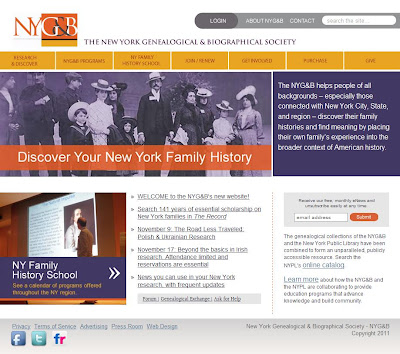 The Schenectady County Historical Society (SCHS) will be hosting a Genealogy Day from 9:00 a.m. to 4:00 p.m. on Saturday, October 29, 2011 at SCHS, 32 Washington Avenue, Schenectady. Participants in Genealogy Day at the Schenectady County Historical Society will explore many possible ways to uncover your family history.
The Schenectady County Historical Society (SCHS) will be hosting a Genealogy Day from 9:00 a.m. to 4:00 p.m. on Saturday, October 29, 2011 at SCHS, 32 Washington Avenue, Schenectady. Participants in Genealogy Day at the Schenectady County Historical Society will explore many possible ways to uncover your family history.
Genealogy Day will feature four speakers. The morning speakers, Phyllis Budka and Alan Horbal, will focus on their experiences in researching Polish and Polish-American genealogy. Genealogist Nancy Curran will discuss using New York State vital records in tracing your genealogy. Chris Hunter, Curator at the Schenectady Museum & Suits-Bueche Planetarium, will speak about the resources available for researching your GE ancestor.
The afternoon portion of Genealogy Day offers participants the opportunity to explore the resources available at the Grems-Doolittle Library. The Librarian and library volunteers will be on hand to field questions, assist researchers, help participants get started in their genealogy research, or brainstorm strategies to overcome “brick wall” genealogical research problems that appear too difficult to solve.
Pre-registration for Genealogy Day is suggested, due to limited seating. The cost of admission for the day is $5.00- admission is free for members of the Schenectady County Historical Society. Attendees are asked to bring their own bag lunch. Beverages and desserts will be provided by Grems-Doolittle Library volunteers.
Genealogy Day Schedule for Saturday, October 29
9:00 a.m. – 9:45 a.m.
Pieces of Me
Speaker: Phyllis Budka
“To me it is a mystery why I must study history” – Those cheeky words form the opening line of Phyllis’ poem that appeared in “The Watchtower,” the Mont Pleasant High School student newspaper, over 50 years ago. Her recent research in family genealogy has awakened her interest in European history and she suddenly feels like a human archeological dig. Phyllis Rita Zych Budka was born in Schenectady and attended St. Adalbert’s School, McKinley Junior High and Mont Pleasant High School. She received a degree in Russian Language from the University of Rochester. In 1964, she married Alfred Budka, also a native Schenectadian. Phyllis earned a Master’s degree in Mechanical Engineering from Union College in 1982. Phyllis and Al owned a welding supplies firm at that time. In 1991, Phyllis became a GE employee and retired in 2008. She has three children and seven grandchildren.
10:00 a.m. – 10:45 a.m.
Research in Southern Poland and Hints for You in Doing Research in Poland
Speaker: Alan Horbal
Alan Horbal will share his experience in doing genealogical research in Poland and present strategies and tips for learning about your ancestors from Poland. He has worked as a volunteer at the National Archives and Record Center in Pittsfield, Massachusetts since 2001, where he instructs users on how to use government records in their research. He has also taught courses on genealogy research at Williams College.
11:00 a.m. – 11:45 a.m.
Vital Records in New York State
Speaker: Nancy Johnsen Curran
This talk will concentrate on the valuable Department of Health vital records indexes at the NYS Archives in Albany. Nancy Johnsen Curran is an experienced genealogist who focuses on the capital region of New York State. Her research takes her to the NYS Library and Archives in Albany as well as to repositories such as courthouses, historical societies and cemeteries in the area. In the fall 2011 semester Curran will teach a course on genealogy research at Schenectady County Community College. Curran is a member of the board of trustees of the New Netherland Institute and has served on the board of the Schenectady County Historical Society.
12:00 p.m. – 12:30 p.m.
Lunch Break – Please bring your own bag lunch- drinks and desserts will be provided.
12:45 p.m. – 1:15 p.m.
Using the GE Archives for Genealogy Research
Speaker: Chris Hunter
Learn about the variety of resources that are available for researching your GE ancestor, and about digital initiatives that will improve accessibility to valuable sources like the GE Schenectady Works News employee newsletters. Chris Hunter is Curator at the Schenectady Museum & Suits-Bueche Planetarium, and has overseen the Museum’s industrial history archive since 2000.
1:30 p.m. – 4:00 p.m.
Q&A in the Library and Open Research Time with Library Volunteers
Explore the resources available in Schenectady County Historical Society’s Grems-Doolittle Library, including family files, photographs, family genealogies and lineages, church records, cemetery records, vital records indexes, wills, deeds, local and New York State histories, maps, collections of personal papers and organizational records, genealogy publications, and more. The librarian and library volunteers will be on hand to assist researchers and answer questions.
For more information about Genealogy Day, or to pre-register, contact Melissa Tacke, Librarian/Archivist at the Schenectady County Historical Society, by phone at 518-374-0263, option “3”, or by email at [email protected]. The Schenectady County Historical Society is wheelchair accessible, with off-street parking behind the building and overflow parking next door at the YWCA.
 The New York State library is offering two history related public programs in January. These programs are free and open to the public. Participants can register online, e-mail [email protected], or call 518-474-2274. The organizers ask that participants contact them if any reasonable accommodation under the Americans with Disabilities Act is required at least three business days prior to the program date.
The New York State library is offering two history related public programs in January. These programs are free and open to the public. Participants can register online, e-mail [email protected], or call 518-474-2274. The organizers ask that participants contact them if any reasonable accommodation under the Americans with Disabilities Act is required at least three business days prior to the program date. Independent scholar Anthony Vaver’s blog
Independent scholar Anthony Vaver’s blog 




